 “My quarrel with propaganda in the theatre is that it’s such damned unconvincing propaganda—whereas, if you will restrain the propaganda purpose to the selection of the life to be portrayed and then let that lie live itself without comment, it does your trick. I advise this in the name of flesh & blood propaganda!”
“My quarrel with propaganda in the theatre is that it’s such damned unconvincing propaganda—whereas, if you will restrain the propaganda purpose to the selection of the life to be portrayed and then let that lie live itself without comment, it does your trick. I advise this in the name of flesh & blood propaganda!”
Eugene O’Neill, letter to Michael Gold (July 2, 1926)

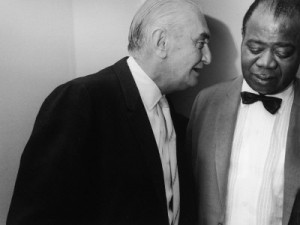 Ricky and I do, however, interpret certain crucial matters of fact in sharply different ways. The one that is most relevant in this connection is that he believes Armstrong to have remained staunchly loyal to Joe Glaser, his manager, to the very end of his life. Accordingly, he completely discounts the contradictory testimony of George Wein, who
Ricky and I do, however, interpret certain crucial matters of fact in sharply different ways. The one that is most relevant in this connection is that he believes Armstrong to have remained staunchly loyal to Joe Glaser, his manager, to the very end of his life. Accordingly, he completely discounts the contradictory testimony of George Wein, who 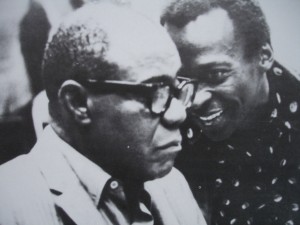 Ricky also contends that Miles Davis took a more benign view of Armstrong’s old-fashioned stage manner than the fictional Davis portrayed in Satchmo at the Waldorf. Up to a point, I agree. The “Miles Davis” of Satchmo unequivocally calls Armstrong an Uncle Tom. The real Davis, by contrast, said different things about Armstrong at different times in his life, some of which closely track what he says in the play and some of which do not. My “Miles Davis,” however, is a deliberately simplified version of the real Davis, a Greek-chorus character whose dramatic function is to embody the hostile attitudes toward Armstrong’s public persona that were widely held by blacks of a younger generation—including, at times, Miles himself.
Ricky also contends that Miles Davis took a more benign view of Armstrong’s old-fashioned stage manner than the fictional Davis portrayed in Satchmo at the Waldorf. Up to a point, I agree. The “Miles Davis” of Satchmo unequivocally calls Armstrong an Uncle Tom. The real Davis, by contrast, said different things about Armstrong at different times in his life, some of which closely track what he says in the play and some of which do not. My “Miles Davis,” however, is a deliberately simplified version of the real Davis, a Greek-chorus character whose dramatic function is to embody the hostile attitudes toward Armstrong’s public persona that were widely held by blacks of a younger generation—including, at times, Miles himself.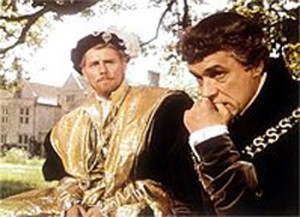 As for Satchmo at the Waldorf, it is, as I’ve said all along, a work of fiction, albeit one that I believe to be essentially accurate in its overall portrayal of the personality and attitudes of Louis Armstrong. Nevertheless, its “accuracy” is not that of a primary-source biography like Pops. Satchmo is a drama, with all the compression, simplification, transposition, and alteration implied by that word. If you’ve seen and enjoyed Abe Lincoln in Illinois or A Man for All Seasons, you’ll know exactly what I was trying to do. (Amadeus, which is far more fictional than Satchmo, is another matter altogether, though I do believe it to be a great work of theatrical art.)
As for Satchmo at the Waldorf, it is, as I’ve said all along, a work of fiction, albeit one that I believe to be essentially accurate in its overall portrayal of the personality and attitudes of Louis Armstrong. Nevertheless, its “accuracy” is not that of a primary-source biography like Pops. Satchmo is a drama, with all the compression, simplification, transposition, and alteration implied by that word. If you’ve seen and enjoyed Abe Lincoln in Illinois or A Man for All Seasons, you’ll know exactly what I was trying to do. (Amadeus, which is far more fictional than Satchmo, is another matter altogether, though I do believe it to be a great work of theatrical art.)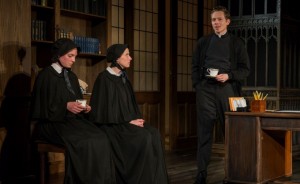 The secret of the success of Mr. Brown’s version is the precisely gauged scale of the acting. Brían F. O’Byrne and Cherry Jones, who created the roles of Father Flynn, the charismatic priest, and Sister Aloysius, the hard-boiled nun who is resolved to bring him down, gave larger-than-life performances that were magnetic but—in the best possible sense of the word—the least little bit stagy. Steve Haggard and Karen Janes Woditsch, by contrast, give the impression of having wandered into the theater from the sanctuary downstairs: Mr. Haggard is not flashy (and therefore suspicious) but disarmingly affable, while Ms. Woditsch plays the implacable Sister Aloysius without the slightest trace of theatricality….
The secret of the success of Mr. Brown’s version is the precisely gauged scale of the acting. Brían F. O’Byrne and Cherry Jones, who created the roles of Father Flynn, the charismatic priest, and Sister Aloysius, the hard-boiled nun who is resolved to bring him down, gave larger-than-life performances that were magnetic but—in the best possible sense of the word—the least little bit stagy. Steve Haggard and Karen Janes Woditsch, by contrast, give the impression of having wandered into the theater from the sanctuary downstairs: Mr. Haggard is not flashy (and therefore suspicious) but disarmingly affable, while Ms. Woditsch plays the implacable Sister Aloysius without the slightest trace of theatricality….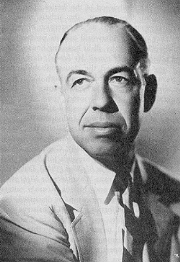 Don’t blush if you came up blank—this one’s for specialists only. All 10 films were scored by Roy Webb, who served as RKO’s chief staff composer from 1936 to 1955. A kindly, soft-spoken craftsman who died in 1982 at the age of 94, Webb is the most obscure of the major film-music composers. He never won an Oscar (though he was nominated seven times) and published only one article about his work. Today he is mainly remembered for “Notorious,” his sole collaboration with Alfred Hitchcock. Only two CDs of his scores have been released, and he mostly figures in passing, if at all, in published histories of film music. Yet Webb was the peer of such better-known contemporaries as Alfred Newman, Max Steiner and Dmitri Tiomkin, and there is no good reason why his name and work aren’t far more familiar.
Don’t blush if you came up blank—this one’s for specialists only. All 10 films were scored by Roy Webb, who served as RKO’s chief staff composer from 1936 to 1955. A kindly, soft-spoken craftsman who died in 1982 at the age of 94, Webb is the most obscure of the major film-music composers. He never won an Oscar (though he was nominated seven times) and published only one article about his work. Today he is mainly remembered for “Notorious,” his sole collaboration with Alfred Hitchcock. Only two CDs of his scores have been released, and he mostly figures in passing, if at all, in published histories of film music. Yet Webb was the peer of such better-known contemporaries as Alfred Newman, Max Steiner and Dmitri Tiomkin, and there is no good reason why his name and work aren’t far more familiar.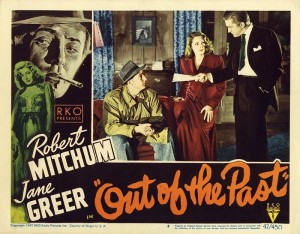 But Webb was at his best in film noir, above all in “Out of the Past,” Tourneur’s 1947 masterpiece, in which all of his stylistic traits were fused into a tightly unified score. Robert Mitchum plays a small-town gas-station owner whose violent past catches up with him at last and sweeps him into a deadly whirlpool of big-city turmoil. Unlike less perceptive composers, Webb sensed that film noir is rooted in a bruised, disillusioned romanticism, and so the main-title theme of “Out of the Past,” which is woven throughout the film (Mitchum even whistles it), is not a piece of pounding musical excitement but a warmly outdoorsy theme whose unexpected changes of key hint at trouble ahead….
But Webb was at his best in film noir, above all in “Out of the Past,” Tourneur’s 1947 masterpiece, in which all of his stylistic traits were fused into a tightly unified score. Robert Mitchum plays a small-town gas-station owner whose violent past catches up with him at last and sweeps him into a deadly whirlpool of big-city turmoil. Unlike less perceptive composers, Webb sensed that film noir is rooted in a bruised, disillusioned romanticism, and so the main-title theme of “Out of the Past,” which is woven throughout the film (Mitchum even whistles it), is not a piece of pounding musical excitement but a warmly outdoorsy theme whose unexpected changes of key hint at trouble ahead….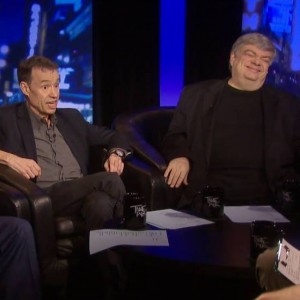 This is just to remind you that the latest episode of
This is just to remind you that the latest episode of  CLOSING NEXT WEEK IN BOSTON:
CLOSING NEXT WEEK IN BOSTON: